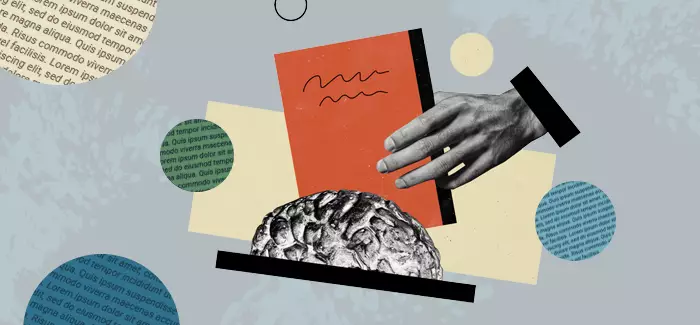Does reading improve memory?Â

Written by Shannon Sharpe

Reviewed by Briana Houlihan, MBA, G-PM, Dean, College of General Studies

Bookworms, rejoice! It turns out that reading isn’t just a cozy escape or an excuse to skip the gym. It’s like a full-body workout for your brain. Scientists have determined that whether you’re lost in a novel or soaking up some nonfiction wisdom, engaging with lengthy and complex texts can yield improved memory — and a whole lot more.
How does reading improve memory?
Asking “Does reading improve memory?” is like asking if broccoli is good for you. Yes, and not only in the ways you think.
Just as broccoli has more than vitamin C to recommend it, reading has been shown in multiple studies to improve a range of memory functions. indicated that those who engaged in regular leisure reading showed greater improvements in verbal working memory, episodic memory and sentence integration than their peers who completed a puzzle-based control task.
Other studies suggest similar benefits. For example, people who read and write throughout their lives experience a slower rate of memory decline in older age compared to those with average mental activity — and nonreaders decline faster.
Kristen McQuinn isn’t surprised the answer to “Does reading improve memory?” is resoundingly positive. As the faculty development chair in the College of General Studies at °®¶ą´«Ă˝, McQuinn teaches classes on science fiction and fairy tales, and she’s seen the benefits of regular reading play out among students. She emphasizes that regular, thoughtful reading demands focus and presence, which itself becomes memory training. “Blocking off time to read really sharpens focus,” McQuinn says. “You come away energized, reflecting on what you’ve just absorbed.”
How reading impacts the brain
When you read, you’re juggling characters, plot arcs and background stories. That mental stimulation acts as memory training. Each new memory creates fresh brain pathways or strengthens existing ones, essentially exercising your brain. This can contribute to several potential benefits, including the following.
Reading can support memory health
Studies suggest that lifelong reading may be associated with slower memory decline. Smithsonian magazine, for example, cites one study that indicates lifelong bookworms experienced memory decline at a rate 32% slower than those with average mental activity. And people who rarely read or wrote as they aged? Their memory slipped 48% faster than that of average readers.
Reading can improve focusÂ
Reading not only improves memory. It also improves focus.
“We can’t pretend we’re not overrun with digital media,” McQuinn notes. “This can make it hard to fully concentrate on one activity.” Reading, however, is one of the few activities that consistently demands sustained attention. Dedicating your uninterrupted attention to reading for just 20 to 30 minutes a day can help strengthen your overall ability to focus.Â
This benefit can extend far beyond a college English class. McQuinn recalls a student who wasn’t interested in her science fiction class. “He was just taking the class to satisfy a credit requirement,” she says. “He later told me he learned how to apply the things that we learned in class to various other topics.” Focus, critical thinking, analysis — the skills you develop while reading may well end up being applicable to numerous other endeavors.
Reading can reduce stressÂ
Burnout is real, and students who are balancing their studies with other obligations such as work and family are very susceptible to it. “If you’re a working parent who has two different jobs and kids in school, you have little time to read,” McQuinn says. But finding those small bits of time to do so could help your mental health.
A Shanghai University of Political Science and Law study found that an eight-week reading program — using both print and audiobooks — significantly reduced stress and boosted cognitive performance among college students.
When stress levels drop, memory gets a major lift too, since a calmer mind processes and retains information more efficiently. In other words, making time to read is an investment in your cognitive well-being.
Reading can enhance empathy
As McQuinn notes, reading fosters your capacity to understand others. An article in suggests that reading literary fiction significantly improves one’s ability to interpret emotions and grasp complex perspectives. This is because nuanced, unpredictable characters invite us to imagine their motives and inner lives. When readers engage with a story, they see things from points of view they never considered before. It opens people up to the experiences of others.
Reading can make you a better writer
“Does reading improve memory?” isn’t the only question to ask. You might also wonder if it can improve your writing.
Reading widely and often exposes you to a broader vocabulary and more creative sentence structures. Have you read Shakespeare or Dickens? Both are part of the literary canon, but their works employ wildly different words and sentence structures. And those are just two examples.
The more you read, the more of this you’re exposed to — and it can come out in interesting ways. From emails to journaling, you may find your writing becomes clearer and more compelling the more you read.Â
How to make reading work for you
The benefits of cracking a book are vast, but how do you go from the question of “Does reading improve memory?” to the practical application of reading regularly? McQuinn has plenty of tips.
- Take notes. Jotting things down helps your brain hang on to new info. “Whether it’s in a journal, notebook or even in the margins of your books, highlight things and summarize chapters,” McQuinn says. “Even if it’s one or two sentences, thinking about these things helps you retain what you’ve read.”
- Mix formats. “For busy students who have to read something they’re not interested in, audiobooks are really helpful,” McQuinn says. “You can listen to it while you’re driving somewhere or cleaning the house.” Or, if your schedule would benefit from a hybrid approach, consider pairing audiobooks with print. You might listen to the audiobook while on the go, for example, and read another chapter when relaxing in bed. It’s a flexible habit that fits easily into busy lives.
- Read more than one book. Switching between genres or topics keeps reading from feeling like homework and helps maintain focus and curiosity. McQuinn encourages variety. “If you have to read a book for a class that you’re not interested in, of course block out time for that. But also give yourself little mental snacks and read a page or two of a book you enjoy.”
- Explore communities. “For students struggling with a book, I advise them to go on YouTube or TikTok and find people discussing those books or authors,” McQuinn says. “There’s always someone who’ll say something interesting — and that can be what helps you get through it.” Book clubs are another option. “When discussing a book with others, it exposes you to different opinions and the experiences they bring to that piece of literature,” she says. “It reinforces the empathy aspect. We live in a plural society, and people’s experiences differ.”
- Make it intentional. Turn off notifications, set your phone aside and carve out even just 15 distraction-free minutes. “Sometimes it has to be a conscious effort,” McQuinn says. “When I catch myself doom-scrolling, I’ll remind myself this is not good for my mental health. Then I’ll put my phone on airplane mode, place it another room and read.”Â
Write your own ending to “Does reading improve memory?”
So, not only does reading improve memory (potentially), but it offers benefits you can apply to many facets in life. If you’re ready to put your reading skills to work in a dedicated degree program, explore the online options available at °®¶ą´«Ă˝.
Or start slowly with a single course or two like Folklore and Fairytales or Major American Novel (prerequisites apply) to steep yourself in new texts and ways of understanding them.
As McQuinn reminds her students, “Finding different ways to engage with books is interesting to a lot of students. If you’re struggling with reading something, look to alternate ways to enjoy it.”
Read more articles like this:

ABOUT THE AUTHOR
Shannon Sharpe is a Chicago-based content strategist and writer with more than 20 years of experience in journalism, storytelling and brand communications. She has developed content for both publications and corporations, spanning topics from design and lifestyle to healthcare and corporate communications. She holds a bachelor’s degree in marketing from Boston College and a master’s degree in journalism from Columbia University. Outside of work, she enjoys exploring Chicago’s vibrant cultural scene, experimenting with new recipes and working on her first novel.

ABOUT THE REVIEWER
Briana Houlihan is the dean of the College of General Studies at °®¶ą´«Ă˝. For more than 20 years, Houlihan has strongly advocated for first-generation and underserved working learners. She has made it her mission to enhance the skills focus within general education coursework to bring value to undergraduate students from day one of their program.
This article has been vetted by °®¶ą´«Ă˝'s editorial advisory committee.Â
Read more about our editorial process.


